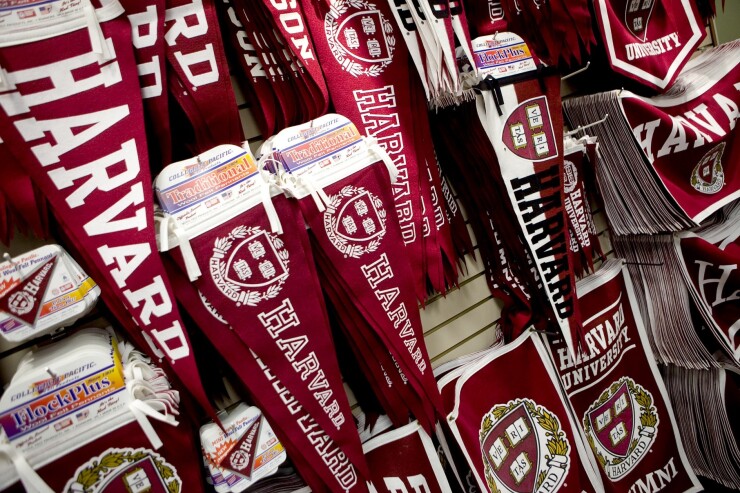A tax on wealthy college endowments isn’t set to be collected for more than a year, yet schools are working behind the scenes to roll it back.
A group including Yale University is trying to help two members of the U.S. House of Representatives, a Republican and Democrat, get more sponsors for a bill to repeal the tax, Richard Jacob, who oversees federal and state relations at the New Haven, Connecticut school, said in an interview.
Drew Faust, Harvard University’s outgoing president, is scheduled to meet this week with the co-sponsors, Alabama Republican Bradley Byrne and John Delaney, a Democrat from Maryland.
“I will be encouraging elected officials to undo this damaging and unprecedented tax on the charitable sector, and in doing so to support education, financial aid, student success, and medical research,” Faust said in a statement.

Yale and Harvard are some of the 30 private colleges that would pay the tax, which isn’t adjusted for inflation. Byrne believes the original endowment tax provision is bad policy, said Seth Morrow, his spokesman. Legislators are trying to advance the repeal bill either as a stand-alone or attached to another bill, he said.
About 50 schools sent congressional leadership a letter in March, asking them to revisit the “misguided policy.” Separately, a trade group is assembling questions from colleges to present to the Internal Revenue Service and Treasury Department.
Congress for years has been curious about how colleges spend their endowments, especially as the price tag rises faster than inflation. Previous interest had centered on colleges spending more on their own campuses while the new levy is a general tax.
Like other industries, colleges are struggling to understand the law’s new rules and interpret lawmakers’ intentions on changes. The Treasury Department in February didn’t include guidance about endowments in a 33-page document about various tax provisions.
The change for colleges is a 1.4 percent tax on an endowment’s annual net investment gains. Schools that meet the threshold of at least $500,000 of endowment per student include Princeton University, Williams College and Amherst College.
Little else is known about the tax, including how students are defined, how endowment assets are counted or whether donor-restricted money is part of the assessment. The tax, part of the Republican overhaul passed in December, is expected to raise $200 million annually.
The primary goal of tax reform was to provide middle-class tax relief and expand American jobs, said Katie Niederee, a spokeswoman for Orrin Hatch, chairman of the Senate Finance Committee. After implementing more immediate provisions, those regarding endowments will be addressed, she said.
The Education Department already collects information about colleges, and the government may not want to duplicate data that already exists, said David Bergeron, former head of postsecondary education at the Education Department. Plus, colleges will want a say about what metrics are used.
Tax Confusion
“This new tax on universities is just on the merits wrong, but it is also being executed in a very sloppy way,” Congressman Delaney of Maryland said in a statement. “The confusion as to how this tax will be implemented is another example of how irresponsible it was to jam through this massive bill so quickly with no real deliberation or oversight.”
Schools that meet the threshold are already coming up with different conclusions. Trinity University and Washington and Lee University each have trusts outside their endowments that they don’t control but that benefit the schools.
Trinity’s $1.2 billion fund appears to fit the criteria to pay the tax based on the endowment per student threshold, yet officials at Washington and Lee in Virginia think some of its almost $1.6 billion endowment might be excluded.
About $360 million of Trinity’s endowment is managed by banks as the trustee on behalf of deceased donors. It’s unclear if income from those investments is taxable, said Gary Logan, vice president for finance and administration at the Texas school.
At Washington and Lee, a private foundation not associated with the school holds about $435 million, mostly in Coca-Cola Co. stock, on its behalf.
“We’re all waiting for the IRS,” said Steven McAllister, vice president for finance at Washington and Lee. “The sooner we understand what it is we will be taxed on, the better we can prepare and plan appropriately.”





